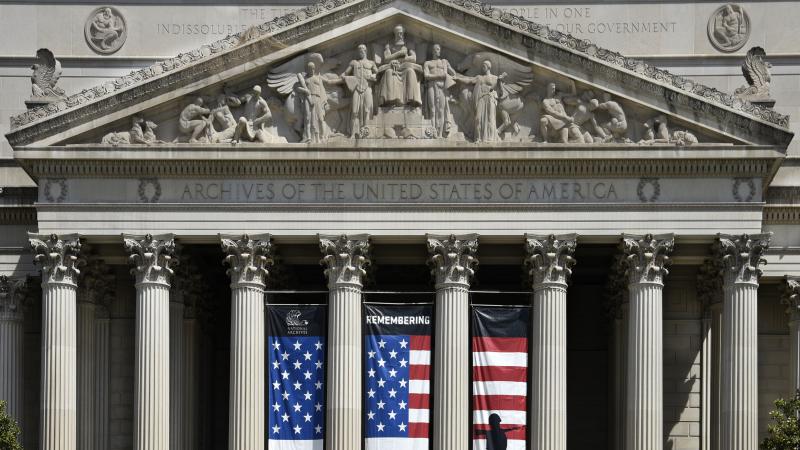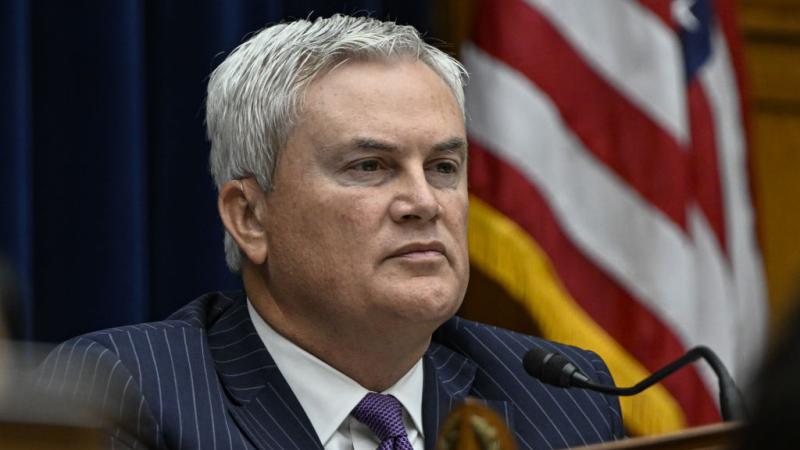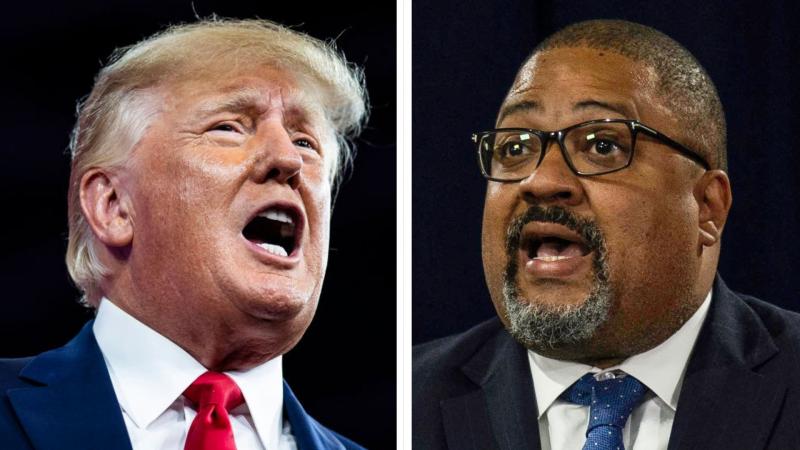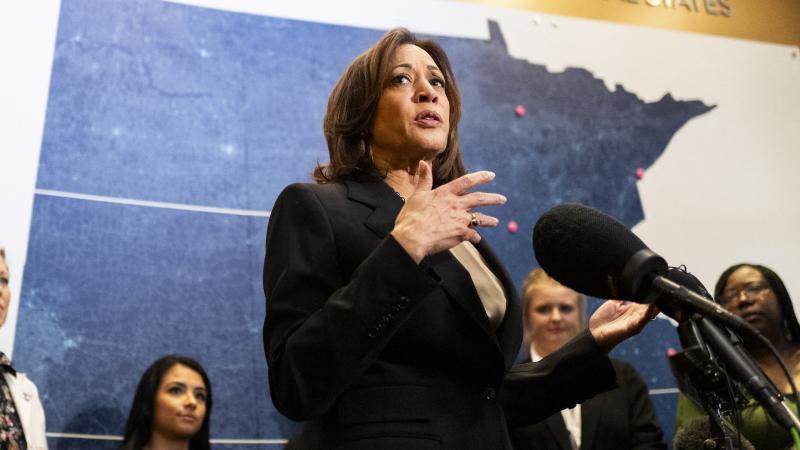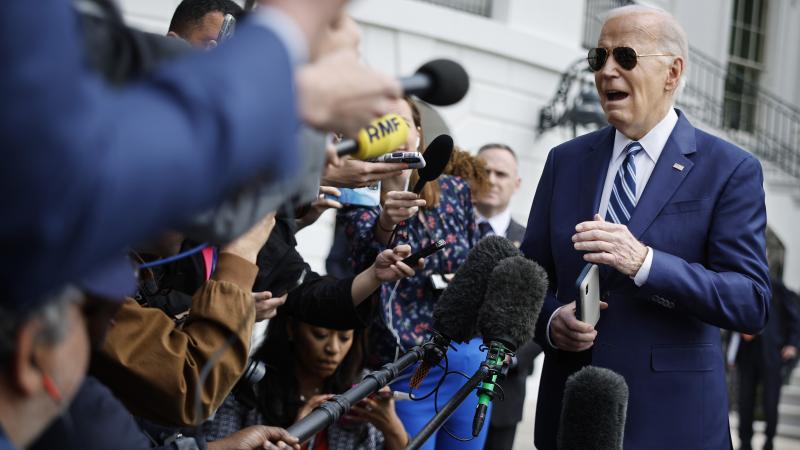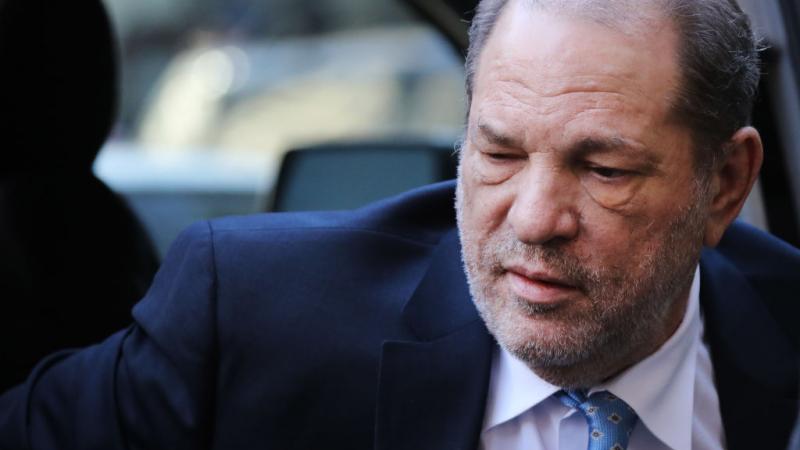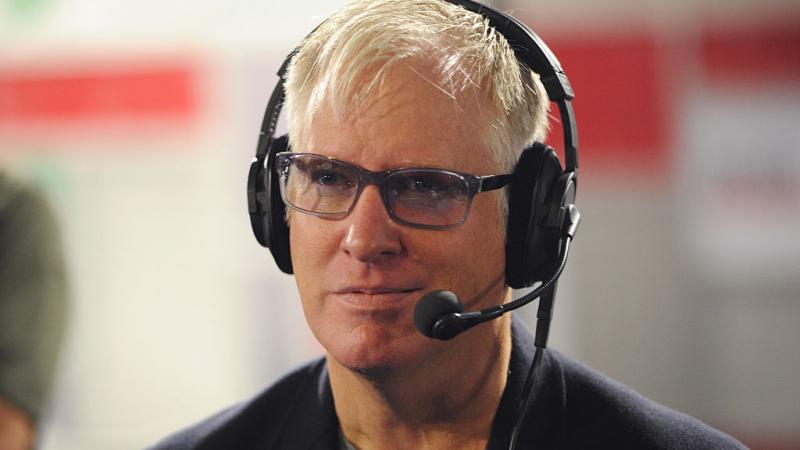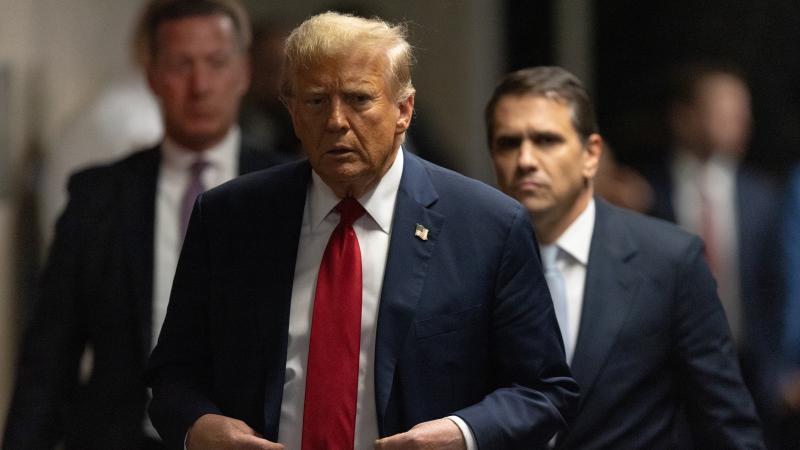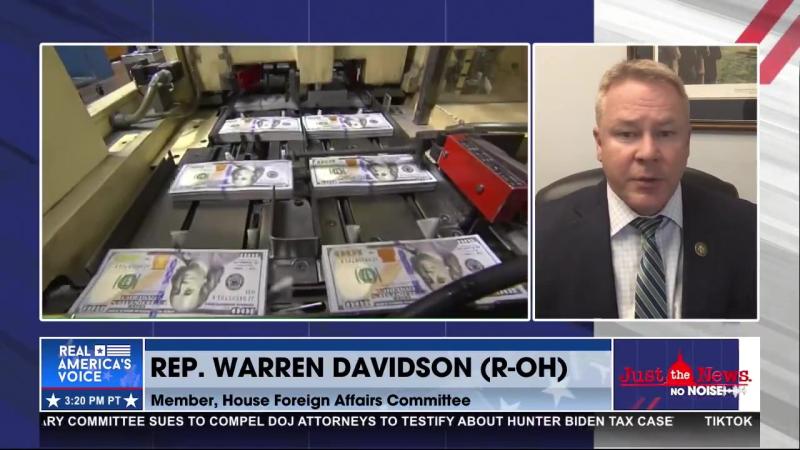Left's 'threat to democracy' narrative jumps the shark following incidents at Pelosi home, Hobbs HQ
Democrats and the media are expanding an often-used line of attack against Trump and his supporters to areas where the connection is tenuous — while keeping politics at arm's length when Republicans are the victims.
For years, leading Democrats and allied media outlets have been invoking what they claim is an existential "threat to democracy" to stigmatize Donald Trump and the populist conservative movement aligned with him.
But with the left's reach to blame Republican political rhetoric for last week's attack on Paul Pelosi and the break-in at the campaign office of Arizona Democrat gubernatorial nominee Katie Hobbs — coupled with its lack of commensurate concern with apparently political violence against Republicans — the "threat to democracy" narrative may have jumped the shark.
The notion that Trump and the MAGA movement threaten democracy dates back to the 2016 presidential campaign, since which Democrats and journalists have consistently portrayed the 45th president and those who support him as threats to democracy. Following the Jan. 6 Capitol riot in particular, this became a daily attack launched against not just Trump and his supporters but also Republicans in general.
In recent days, facing an impending political reckoning in the Nov. 8 midterm elections, Democrats have stretched the "threat to democracy" narrative beyond any particular context, seemingly applying it to any case when Democrats are victims — such as the incidents at Nancy and Paul Pelosi's San Francisco home and Hobbs' campaign office.
Pelosi's alleged attacker, David DePape, has been mentally ill for years, according to Gypsy Taub, his former life partner and mother of his children, who also suggested DePape shared her progressive politics. DePape reportedly lived with Taub, a locally notorious public nudity activist now in prison, at their Berkeley home complete with a Black Lives Matter sign and an LGBT flag.
Nonetheless, some of the most prominent voices on the political left have framed the attack on Pelosi as the result of alleged Republican incitement and part of a broader right-wing threat to democracy.
Hillary Clinton, for example, took to Twitter, writing: "The Republican Party and its mouthpieces now regularly spread hate and deranged conspiracy theories. It is shocking, but not surprising, that violence is the result. As citizens, we must hold them accountable for their words and the actions that follow."
Biden, meanwhile, connected the attack to Jan. 6 and attempts to challenge the results of the 2020 presidential election.
"This is despicable," Biden said Friday of the Pelosi assault. "There's no place in America. There's too much violence, political violence, too much hatred, too much vitriol. And what makes us think that one party can talk about stolen elections, COVID being a hoax, that it's all a bunch of lies, and it not affect people who may not be so well balanced."
Biden added "that the same chant was used by this guy that they have in custody that was used on January 6, the attack on the U.S. Capitol."
Biden has consistently described Trump and the MAGA movement as threats to the country — in September, he said so-called "MAGA Republicans" represent an antidemocratic "extremism that threatens the very foundations of our republic."
White House Press Secretary Karine Jean-Pierre echoed her boss Sunday on MSNBC.
"The thing that is probably the most haunting about when we hear the reports of this assailant, this attacker you were speaking of, is that he was yelling out the things that we heard during January 6, [asking] 'Where is Nancy?'" she said.
"The president himself has been very clear … the reason why this president ran for president in the first place is the attack we were seeing on democracy," Jean-Pierre added. "What we saw on January 6 still exists."
DePape had posted online about the 2020 election being stolen. According to DePape's ex, he had been getting entangled in conspiracy theories in recent months. In the past, however, he's also shared posts critical of George W. Bush and claimed "Jesus is the antichrist," indicating a diverse set of extreme views that can't be confined neatly in any political box.
In Congress, meanwhile, Democrats are framing the assault in San Francisco as part of a broader threat to democracy, in many cases linking it to the so-called "big lie" that the 2020 election was stolen from Trump.
"If we do not stop the big lie, perpetuated by those who seek to win at any cost, our democracy will cease to exist," Rep. Elaine Luria (D-Va.), a member of the House committee investigating Jan. 6, told the Associated Press for a story on the Pelosi attack. "Then nothing else we do will have mattered."
Many Democrat lawmakers were quick to label the alleged attacker a right-wing extremist without evidence beyond his erratic social media postings and media reports citing an unnamed source "familiar with the matter" as saying the suspect shouted "Where's Nancy?" while in the Pelosi household.
"We need to say it out loud," said Rep. Bill Pascrell (D-N.J.). "Militia maniacs, and other rightwing domestic terrorists have exploded because Republicans have spent years winking, nodding, and endorsing their extremism."
"A far right white nationalist tried to assassinate the Speaker of the House and almost killed her husband a year after violent insurrectionists tried to find her and kill her in the Capitol," tweeted Rep. Ilhan Omar (D-Minn.). "And the Republican Party's response is to either ignore it or belittle it."
Rep. Alexandria Ocasio-Cortez (D-N.Y.) added that the attacker "shares" the "rhetoric" of House Minority Leader Kevin McCarthy (R-Calif.).
Republicans have condemned the attack on Pelosi but denied any culpability.
Beyond Congress, reporters, columnists, and other journalists at prominent media outlets such as NBC News, the Washington Post, and elsewhere have similarly painted the Pelosi attack as a product of Republican attacks on democracy.
CNN Chief Political Correspondent Dana Bash, for example, said the attacker asking for Nancy Pelosi was "the identical phrase we heard with our own ears on Jan. 6 from the rioters, and it's all connected, and it's connected by a very dark and very dangerous undertone.
"Not even an undertone. It's a completely above the surface now of anger and hostility across the board, and it's got to stop."
Hollywood director and longtime liberal activist Rob Reiner gave his take on the Pelosi incident, tweeting, "Donald Trump is 100% responsible for this and Jan.6."
Democrats and the media were similarly quick to paint the break-in at the Hobbs campaign office as the product of GOP extremism threatening democracy.
The Hobbs campaign itself implied that her Republican opponent, Kari Lake, and Lake's supporters contributed to the incident by "spreading dangerous misinformation and inciting threats against anyone they see fit."
Lake called the statement "absolutely absurd" and "defamatory."
The statement came a few days after CNN ran an opinion piece slamming Lake for challenging the results of the 2020 election, describing her as "a threat to our democratic republic" running "against American democracy." The article also referred to Lake as "Donald Trump in high heels."
It's unclear why precisely these voices are connecting those who challenged the results of the 2020 presidential election to Hobbs or Pelosi almost two years after Congress certified the results.
Meanwhile, Republicans have also been victims of similar recent attacks — however, Democrats and the media weren't so quick to assign guilt to the other side of the political aisle.
Earlier this month, for example, a political activist canvassing on behalf of Florida Republican Sen. Marco Rubio sustained significant injuries after a group of four brutally assaulted him. The canvasser was also reportedly wearing a Rubio shirt and hat of GOP Gov. Ron DeSantis.
According to Rubio, the activist was told "Republicans weren't allowed in the neighborhood." The beating occurred in Hialeah, Fla., which is part of Miami-Dade County, traditionally a Democratic bastion.
The initial police report made no reference to political motivations in the attack.
Over the summer, a man was charged with attempted assault after trying to attack Rep. Lee Zeldin, the Republican nominee for governor in New York.
In North Dakota, a man was charged with murder for fatally running over a teenage boy whom he described as a "Republican extremist."
The same Democrat and media voices who immediately assumed political motivations in the Pelosi and Hobbs attacks didn't do so in any of these recent cases involving Republican victims, according to a Just the News review. There was no similar groundswell to point the finger at Democrats' rhetoric.
The apparent double standard comes as Democrats, widely projected to lose the House in next week's midterm elections and possibly the Senate, are doubling down on a campaign message focused on Jan. 6 and Republicans as a threat to democracy. So far, the strategy hasn't seemed to work, with voters saying Democrats have gone too far in their efforts to target political opponents, according to recent polling.
A new poll also found that despite efforts by Democrats and allied press to paint Trump and "MAGA Republicans" as threats to democracy, nearly as many voters view Biden as an authoritarian threat as they do his predecessor — and the mainstream media itself looms as the most widely feared threat to American democracy.
The Facts Inside Our Reporter's Notebook
Links
- invoking
- Democrats
- journalists
- launched
- Pelosi's San Francisco home
- Hobbs' campaign office
- according
- reportedly
- writing
- connected
- said
- described
- echoed
- shared
- claimed
- blaming
- framing
- told
- said
- tweeted
- added
- NBC News
- Washington Post
- elsewhere
- said
- implied
- called
- piece
- assaulted
- made no reference
- shot
- charged
- charged
- doubling down
- focused
- according
- found


